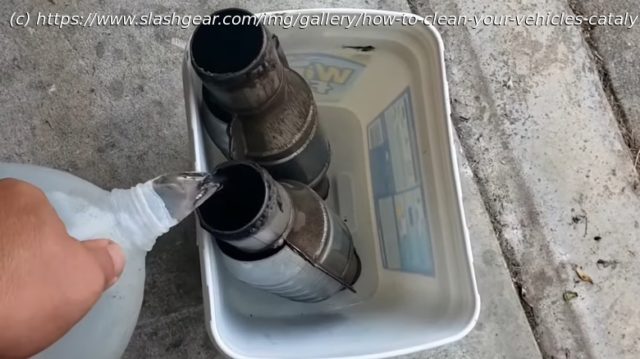Overtime, catalytic converters can build with debris and corrosion, but before replacing it, here are two cleaning methods you can try at home.
Catalytic converters (cats) have been a legal requirement on passenger vehicles with internal combustion engines since the U.S. government passed the Clean Air Act of 1970. That means that if you drive a relatively modern car, it should have one of these parts. Catalytic converters are designed to help prevent our vehicles from dumping excess pollutants into the atmosphere. They’re necessary thanks to the extremely harmful gasses that fossil-fuel-powered engines expel, and they’re an integral part of modern emissions control systems.
However, not everyone is a fan of these new systems. In reality, emissions control systems help our cars perform more efficiently, but they do come with some downsides. For one, catalytic converters are extremely expensive, meaning people like to steal them and replacements can be pretty big financial burdens. Secondly, these devices are prone to wear and tear over time, which means that even if yours is never stolen, you may have to pay to service or replace it at some point.
That last bit is what leads us to the primary question we’ll address in this article: how can you clean your catalytic converter at home? It’s an important and common question, as catalytic converter repairs are pricey, to say the least. Fortunately, it isn’t always necessary to pay a mechanic to do the job for you, and there are some methods you can try at home to clean your cat before paying a pro. As a former auto repair technician and lifelong gearhead, I’ll break them down for you. Together, we’ll cover a couple of different methods you can use to clean your cat, and we’ll even explain why you might need to do so. Let’s dive in.Why would you need or want to clean your car’s catalytic converter?
Before we dive into how to clean your catalytic converter, it may be helpful to explain why you might need to clean it in the first place. We mentioned that catalytic converters are prone to wear and tear over time. While they’re pretty durable, most cats have an expected lifespan of around 10 years. However, that estimated lifespan depends on a lot of factors, like your driving style, the fuel you use, how well you maintain your vehicle, and the environment in which you drive.
Assuming you take excellent care of your car, your catalytic converter may still fail due to age or environmental factors. One of the common ways in which old cats fail is by becoming clogged up by debris and corrosion, or as the result of bad fuel or another mechanical malfunction.






